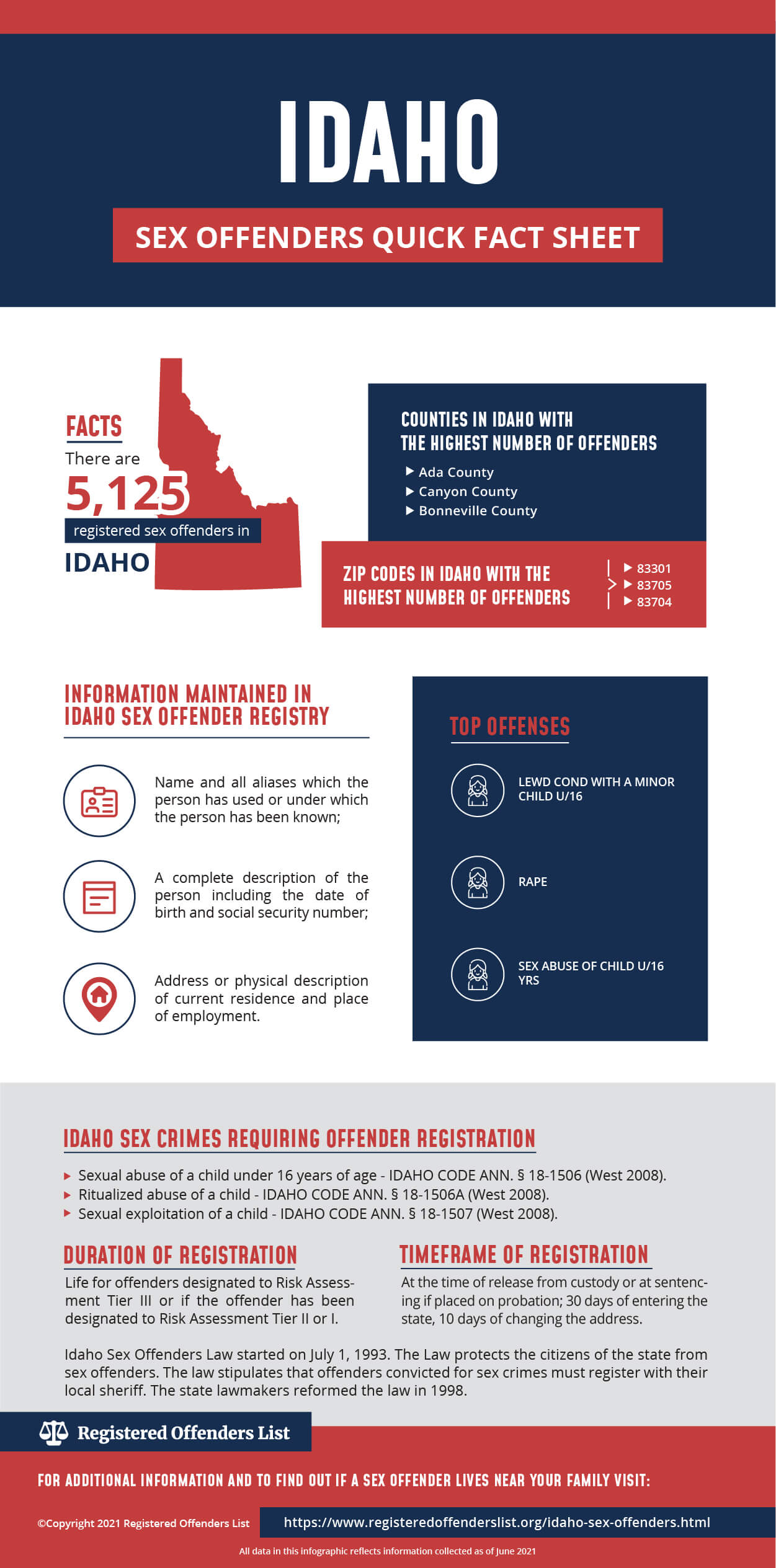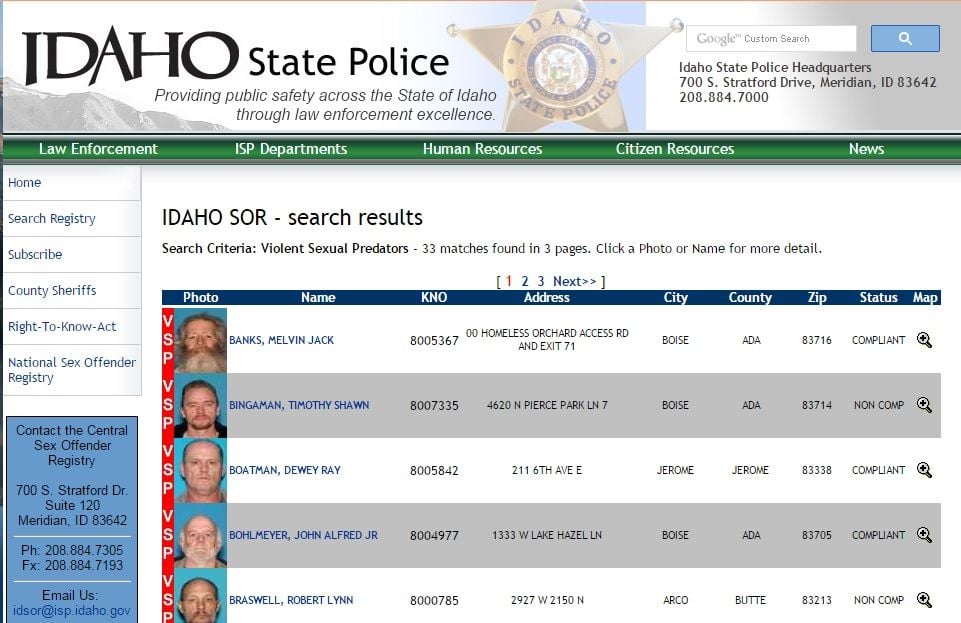Understanding Idaho’s Sex Offender Registry: A Guide to Public Safety and Transparency
Related Articles: Understanding Idaho’s Sex Offender Registry: A Guide to Public Safety and Transparency
Introduction
In this auspicious occasion, we are delighted to delve into the intriguing topic related to Understanding Idaho’s Sex Offender Registry: A Guide to Public Safety and Transparency. Let’s weave interesting information and offer fresh perspectives to the readers.
Table of Content
Understanding Idaho’s Sex Offender Registry: A Guide to Public Safety and Transparency

The Idaho Sex Offender Registry is a vital tool for public safety and transparency, providing a comprehensive database of individuals convicted of sex crimes in the state. This resource allows citizens to access information about registered sex offenders in their communities, empowering them to make informed decisions about their safety and the well-being of their families.
The Purpose and Importance of the Registry
The primary objective of the Idaho Sex Offender Registry is to protect the public from potential harm by individuals convicted of sex offenses. By making information about these individuals publicly accessible, the registry aims to:
- Deter future offenses: The knowledge that their information is publicly available can act as a deterrent for registered sex offenders, encouraging them to adhere to the law and avoid further criminal activity.
- Facilitate community awareness: The registry enables citizens to be aware of the presence of registered sex offenders in their neighborhoods, allowing them to take appropriate precautions and make informed decisions about their safety.
- Enable law enforcement: The registry provides law enforcement with valuable information, aiding them in investigations, monitoring registered offenders, and ensuring compliance with court-ordered restrictions.
Accessing Information on the Idaho Sex Offender Registry
The Idaho Sex Offender Registry is accessible online through the Idaho State Police website. The website provides a user-friendly interface that allows users to search for registered offenders based on various criteria, including:
- Name: Users can search by the offender’s full name, last name, or partial name.
- Location: Users can search by county, city, or ZIP code, allowing them to identify registered offenders within a specific geographic area.
- Physical description: Users can search based on the offender’s physical characteristics, such as age, race, height, and weight.
- Offense details: Users can search based on the type of sex offense committed by the offender.
Information Provided on the Registry
The information available on the Idaho Sex Offender Registry varies depending on the specific offender and the nature of their offense. However, the registry generally includes:
- Full name: The offender’s legal name.
- Date of birth: The offender’s birth date.
- Address: The offender’s current address, if available.
- Physical description: The offender’s physical characteristics, including height, weight, eye color, and hair color.
- Photograph: A recent photograph of the offender.
- Offense details: A summary of the sex offense for which the offender was convicted.
- Release date: The date on which the offender was released from prison or parole.
- Risk level: A classification of the offender’s risk of re-offending.
Understanding Risk Levels
The Idaho Sex Offender Registry categorizes offenders based on their risk of re-offending, using a three-tier system:
- Level 1 (Low Risk): Offenders classified as Level 1 are considered to have a low risk of re-offending.
- Level 2 (Moderate Risk): Offenders classified as Level 2 are considered to have a moderate risk of re-offending.
- Level 3 (High Risk): Offenders classified as Level 3 are considered to have a high risk of re-offending.
The risk level assigned to an offender is determined by a comprehensive assessment that considers various factors, including the nature of the offense, the offender’s criminal history, and their potential for rehabilitation.
Limitations and Considerations
It’s important to note that the Idaho Sex Offender Registry is not a perfect solution for protecting the public. It has limitations that users should be aware of:
- Incomplete information: The registry may not contain complete or accurate information about all registered sex offenders. Some offenders may not be registered, or their information may be outdated.
- Privacy concerns: While the registry aims to protect the public, it also raises privacy concerns for registered sex offenders. Critics argue that the registry can stigmatize and hinder the reintegration of offenders into society.
- False sense of security: The registry should not be seen as a guarantee of safety. It is a tool to increase awareness, but it does not eliminate the risk of sex offenses.
Frequently Asked Questions (FAQs) about the Idaho Sex Offender Registry
Q: What are the legal requirements for registering as a sex offender in Idaho?
A: Individuals convicted of certain sex offenses in Idaho are required to register as sex offenders. The specific offenses that require registration are defined by Idaho law.
Q: How long must an individual remain registered as a sex offender in Idaho?
A: The length of time an individual must remain registered as a sex offender in Idaho varies depending on the nature of the offense and the offender’s risk level.
Q: Can I access the Idaho Sex Offender Registry from outside of Idaho?
A: Yes, the Idaho Sex Offender Registry is accessible to anyone with internet access, regardless of their location.
Q: Is it legal to use the information on the Idaho Sex Offender Registry to harass or intimidate someone?
A: No, it is illegal to use the information on the Idaho Sex Offender Registry for any unlawful purpose, including harassment or intimidation.
Q: Can I remove my name from the Idaho Sex Offender Registry?
A: In most cases, individuals cannot remove their names from the Idaho Sex Offender Registry once they have been registered. However, there are exceptions, such as if the conviction is overturned or if the individual is granted a pardon.
Q: What happens if a registered sex offender fails to comply with the registration requirements?
A: Failure to comply with the registration requirements can result in serious legal consequences, including fines, imprisonment, or other penalties.
Tips for Using the Idaho Sex Offender Registry
- Be aware of the limitations: The registry is a tool, but it is not a perfect solution. It has limitations, and users should be aware of these before relying on it for safety decisions.
- Use the registry responsibly: Avoid using the registry for any unlawful purpose, such as harassment or intimidation.
- Be mindful of privacy concerns: Remember that registered sex offenders are still individuals with rights, and their privacy should be respected.
- Stay informed: The laws and regulations regarding sex offender registration can change, so it is important to stay informed about any updates.
Conclusion
The Idaho Sex Offender Registry is a valuable resource for public safety and transparency. By providing access to information about registered sex offenders, the registry empowers citizens to make informed decisions about their safety and the well-being of their families. However, it is important to use the registry responsibly and to be aware of its limitations. The registry should not be seen as a guarantee of safety, but rather as a tool to increase awareness and promote community vigilance.







Closure
Thus, we hope this article has provided valuable insights into Understanding Idaho’s Sex Offender Registry: A Guide to Public Safety and Transparency. We appreciate your attention to our article. See you in our next article!
